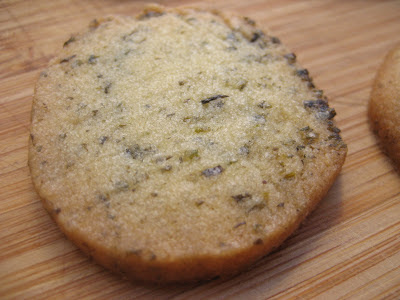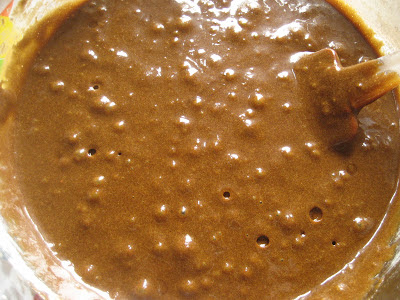First up for January was Dorie Greenspan's Around My French Table. This is a delightful and inspiring cookbook. I was immediately struck by her clear, no-nonsense tone, making French cooking feel very accessible. My first pass through the book also left me feeling like I wanted to make a good 20 or so dishes immediately. A lot appeals, and I also like her approach of including dishes that may not be French in origin, but that have become part of the culinary and cultural fabric of the country.
While I did make a number of recipes from the book (more on that below), I decided to highlight the magical butter cookies known as sablés here, because they are both fun to make and fun to eat. After you've tasted these flavor grenades it'll come as no surprise to hear they are très populaire in France.
Instead of the toasted nori suggested in the book, I happened to be at Trader Joe's and thought a package of their Roasted Seaweed would be perfect. Lo and behold, they have a new seaweed snack on their shelves that was destined for these cookies. Their Sweet Sesame Seaweed doesn't come in sheets, but instead in a mass of crispy, crinkly blades (yup, that's what the leaves of seaweed are called...don't ask me how I know or recall that bit of trivia...), that at first proved themselves difficult to chop, but excellent for making a mess. After a couple tries resulting in flying seaweed bits, I turned to a technique I use for grinding whole allspice, and happily it was very effective. Place ingredient (in this case seaweed bunches) between two sheets of parchment paper and using a rolling pin, run it over the contents until broken down to desired grain/consistency.
Don't kid yourself. These are called butter cookies, because that's their main ingredient. Get over it and get creative with how you flavor them.
I made three different flavors, and brought them as slice-and-bake logs to our most recent food swap—where they were hit!
The Cheez-it-ish Crackers Greenspan features are basically like more delicious Cheez-its, with more butter. I used a raw Emmenthal and it was perfect. The lemon ones (not included in this book, but a variation suggested in her master sablé recipe) were made with fruit from my mom's tree. This made them just that much more special. And the seaweed ones were all that I imagined.
Salty Sweet Seaweed Butter Cookies
Adapted from Around My French Table by Dorie Greenspan
6 tablespoons (3/4 stick), unsalted butter, room temperature
3 tablespoons finely chopped toasted nori, or other seaweed of choice (see above)
2 teaspoons fleur de sel or 1 1/2 teaspoons fine sea salt
1/2 cup plus 1 tablespoon confectioner's sugar
1 large egg yolk
1 1/2 tablespoons extra virgin olive oil
1 cup plus 2 tablespoons all-purpose flour
Optional: flaky sea salt, such as Maldon, for sprinkling
This dough is easy to make by hand using a rubber spatula if your butter is really soft. In a large bowl, mix the butter, salt and chopped seaweed together until smooth and creamy in texture.
Stir in the remaining ingredients following this sequence, but avoid overmixing or overworking the dough: sugar, egg yolk, olive oil, and flour.
When it is smooth, divide into half (or thirds) and roll each piece into a slender log based on the size you want your finished cookies.
Wrap tightly in plastic wrap and chill in the refrigerator for at least one hour, and up to 5 days. You may also keep in the freezer for 2 months.
When you are ready to bake them, preheat the oven to 350° and line a baking sheet with a silicone mat or parchment paper.
Slice each log into cookies "on the scant side of 1/4 inch" (description courtesy of David Lebovitz, who gave Greenspan this recipe). Place them on your baking sheet, cooking only one batch at a time on a rack centered in your oven.
Sprinkle the optional sea salt on top of each cookie at this stage if using.
Bake the cookies for 12 to 14 minutes. They are done when they are slightly firm but not colored.
Transfer to a rack to cool, and cook remaining batches as and when needed.
Cooking Note: The flavor of the Sweet Sesame Seaweed was perfectly suited to use in this recipe. That said, I definitely plan to experiment a bit and will try the toasted nori method to compare. I also wonder if furikake might be a transformative addition?
Other dishes I cooked from this book include:
Orange-Scented Lentil Soup - I love lentils so am always looking out for new ways to prepare them. This recipe immediately tempted my taste buds, and being citrus season, how could I refuse them? My favorite way to pimp this soup out? Top it with a dollop of yogurt, some fresh dill, smoked sea salt, and a bit of hot sauce. (PS It is very hard to make a pureed lentil soup look good).
Lime and Honey Beet Salad - Nice, bright and simple. They way beets should be served in my humble opinion. I added a bit more lime juice than the recipe called for, and used some lime, cilantro and gingergrass flavored salt I had on hand.
Dilled Gravlax with Mustard Sauce - I left this to cure for 72 hours, which concluded this evening...but I didn't tackle the job until after dinner, and was too full to try it. I'm betting it won't disappoint.





.JPG)
.JPG)















































